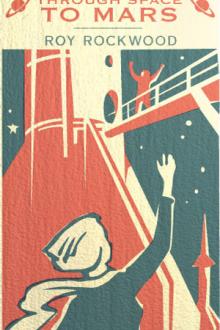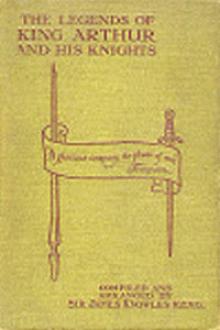Lost on the Moon by Roy Rockwood (best fiction novels .txt) 📕

- Author: Roy Rockwood
- Performer: -
Book online «Lost on the Moon by Roy Rockwood (best fiction novels .txt) 📕». Author Roy Rockwood
is absolutely no air on the moon, also no moisture, and the temperature
is either very high or around the freezing point. We must find out what
it is.”
“How can we?” inquired Mark.
“I’ll soon show you,” went on the German. “Professor Henderson, will
you kindly assist me.”
When it had been decided to come to the moon in quest for the field of
diamonds, certain changes had been made in the Annihilator to fit it
for new conditions that might be met. One of these consisted of an
aperture in the two sides of the projectile permitting certain delicate
instruments to be thrust out, so that the conditions they indicated
could be read on dials or graduated scales from within.
“We will first make a test of the temperature,” said Mr. Roumann, “as
that will be the easiest.” Accordingly a thermometer was put outside,
and those in the air-craft anxiously watched the red column of spirits.
The temperature was marked as seventy-five inside the Annihilator,
but the thermometer had not been outside more than a second before
it began falling.
“Good!” exclaimed Mr. Henderson, as he noted it. “The temperature is
going down. I’d rather have it too cold than too hot. We can stand a
minus fifty of cold better than two hundred and twelve of heat. We have
fur garments with us.”
“It is still going down,” remarked Jack, as he saw the red column drop
down past the thirty mark.
“Below freezing,” added Mark.
The spirits fell in the tube until they touched twenty-eight degrees,
and there they remained.
“Twenty-eight degrees,” remarked Professor Henderson. “That isn’t so
bad. At least, we can stand that if we are warmly clad.”
“Yes, but it will be colder tonight,” said Jack. For they had landed
on the moon in bright sunlight.
“Tonight?” questioned the German scientist, with a smile.
“Yes, it’s always colder when the sun goes down,” went on the lad.
“You have forgotten one thing,” said Mr. Henderson, with a smile at his
young prot�g�. “You must remember, Jack, that the nights and days here
are each fourteen days long—that is, fourteen of our days.”
“How’s that?” asked Jack.
“Why,” broke in Mark, who was a trifle better student than was his
chum, “don’t you remember that the moon rotates on its axis once a
month, or in about twenty-eight days, to be exact, and so half of that
time is day and half night, just as on our earth, when it revolves on
its axis in twenty-four hours, half the time is day and half the time
is night.”
“Sure, I ought to have remembered,” declared Jack.
“Mark is right,” added Mr. Henderson. “And, as we have most fortunately
arrived on the moon at the beginning of the long day, we will have
fourteen days of sunshine, during which we may expect the temperature
to remain at about twenty-eight degrees. But now about the atmosphere.”
“We will test that directly,” went on the German. “It will take some
time longer, though.”
Various instruments were brought forth and thrust out of the opening in
the side of the projectile, which opening was so arranged that it was
closed hermetically while the instruments were put forth. Then the
readings of the dials or scales were taken, and computations made. In
fact, some of what corresponded to the moon’s atmosphere was secured in
a hollow steel cup and brought inside the Annihilator for analysis.
“Well,” remarked Professor Roumann, as he bent over a test tube, the
contents of which he had put through several processes, “I am afraid we
cannot breathe on the moon.”
“Can’t breathe on it?” gasped Jack. “Then we can’t go out and walk
around it.”
“I didn’t say that,” resumed the German, with a smile. “I said we
couldn’t breathe the moon’s atmosphere. In fact there is nothing there
that we would call atmosphere. There is absolutely no oxygen, and there
are a number of poisonous gases that would instantly cause death if
inhaled.”
“Then how are we to get out and hunt for those diamonds, Professor?”
went on Jack. “Gee whiz! if I’d known that, I wouldn’t have come. This
is tough luck!”
“Maybe the professor can suggest a way out of the difficulty, boys,”
spoke Mr. Henderson. “It certainly would be too bad if, after our
perilous trip, we couldn’t get out of our cage and walk around the
moon.”
“I think perhaps I can discover a way so that it will be safe to
venture forth,” said Mr. Roumann. “But I must first conduct some
further experiments. In the meanwhile suppose you boys get out some
fur-lined garments, for, though it is only twenty-eight degrees, we
will need to be well clad after the time spent inside this warm
projectile.”
“It does look as if he expected to get us out,” remarked Jack, as he
and his chum went to where Andy Sudds was.
“Yes, you’ll get a chance to pick up diamonds after all, Jack. That is,
if there are any here.”
“Of course there are diamonds. You wait and see,” and then, with the
help of the old hunter, they took from the store-room their fur
garments.
It was half an hour before the warm clothes were sorted out, and then
the boys went back to where the two professors were.
“Well,” asked Jack cautiously, “can we go outside?”
“I think so,” answered the German cheerfully. “But you must always be
careful to carry one of these with you,” and he handed to each of the
boys a steel rod about two feet long, at the end of which was a small
iron box, with perforations in the sides and top.
“What is this?” asked Jack. “It looks like a magician’s wand.”
“And that is exactly what it is,” said Mr. Henderson. “As there is no
atmosphere fit to breathe on the moon, we have been forced to make our
own, boys. You each hold what may be called torches of life. To venture
out without them would mean instant death by suffocation or poison.”
“And will these save our lives?” asked Mark.
“Yes,” said Mr. Roumann. “In the iron boxes on those rods are certain
chemicals, rich in oxygen and other elements, which, when brought in
contact with the gases on the moon, will dispel a cloud of air about
whoever carries them—air such as we find on our earth. So, boys, be
careful never to venture out without the torches of life. I had them
prepared in anticipation of some such emergency as this, and all that
was necessary was to put in the chemicals. This I have done, and now,
if you wish, you may go out and stroll about the moon.”
ON THE EDGE OF A CRATER
There was a little hesitation after Professor Roumann had spoken. Even
though he assured them all that it would be safe to venture out on the
surface of the moon, with its chilling temperature and its poisonous
“atmosphere” (if such it can be termed), there was an uncanny feeling
about stepping forth into the midst of the desolation that was on every
side.
For it was desolate—terribly so! Not a sound broke the stillness.
There was no life—no motion—as far as could be seen. Not a tree or
shrub relieved the rugged monotony of the landscape. It was like a dead
world.
“And to think that people may have once lived here,” observed Jack, in
a low voice.
“Yes, and to think that there may be people on the other side of the
moon even now,” added Mark. “We must take a look if it’s possible.”
“Well,” remarked Mr. Henderson, after a while, “are we going out and
see what it’s like or not.”
“Of course, we are,” said Jack. “Come on, Mark, I’m not afraid.”
“Me either. Do we have to do anything to the torches to make them
operate, Professor Roumann?”
“Merely press this lever,” and the scientist showed them where there
was one in the handle of the steel rod. “As soon as that is pressed, it
admits a liquid to the chemicals and the oxygen gas is formed, rising
all around you, like a protecting vapor. After that it is automatic.”
“How long will the supply of chemical last?” inquired Jack.
“Each one is calculated to give out gas for nearly two weeks,” was the
reply; “possibly for a little longer. But come, I want to see how they
work. Here is your life-torch, Professor Henderson, and there is one
for you, too, Andy, and Washington.”
“‘Scuse me!” exclaimed the colored man hastily, as he started back
toward the kitchen.
“Why, what’s the matter?” asked Jack. “Don’t you want to go out, and
walk around the moon, and pick up diamonds?”
“Diamonds am all right,” answered Washington, “but I jest done fo’got
dat I ain’t fed my Shanghai rooster to-day, an’ I ‘spects he’s mighty
hungry. You folks go on out an’ pick up a few obde sparklers, an’ when
I gits de Shanghai fed I’ll prognosticate myse’f inter conjunction wif
yo’ all.”
“You mean you’ll join us?” asked Mark.
“Dat’s what I means, suah.”
“Why, I do believe Washington’s afraid!” cried Jack jokingly.
“Askeered! Who’s afraid?” retorted the colored man boldly. “Didn’t I
done tole yo’ dat I got t’ feed my rooster? Heah him crowin’ now? Yo’
all go ‘long, an’ I’ll meet yo’ later,” and with that Washington
disappeared quickly.
“Well, he’ll soon pluck up courage and come out,” declared Professor
Henderson. “Let him go now, and we’ll go out and see what it is like on
the moon.”
“I hope we find those diamonds,” murmured Jack, and Mark smiled.
In order not to admit the poisonous gases into the projectile, it was
decided to leave the Annihilator and return to it by means of a double
door, forming a sort of air lock. It was similar to the water lock used
on the submarine. That is, the adventurers entered a chamber built in
between the two steel walls of their craft. The interior door was then
sealed shut automatically. Next the outer door was opened, and they
could step directly to the surface of the moon and into the deadly
atmosphere.
“Well, are we all ready?” asked Mr. Roumann, as he picked up one of the
chemical torches.
“I guess so,” responded Andy Sudds, who had his gun with him. “I hope I
see some game. I haven’t had a shot in a long while.”
“You’re not likely to up here,” spoke Mr. Henderson. “Game is scarce on
the moon, unless it’s some of that green cheese Washington talked
about.”
They entered the air lock and fastened the door behind them. Then
Professor Roumann pressed on the lever that swung open the outer
portal.
“Hold your torches close to your head,” he called. “The moon atmosphere
may be too strong for us at first until we create a mist of oxygen
about us.”
Out upon the surface of the moon they stepped, probably the first earth
beings so to do, though they had evidence that the inhabitants of Mars
had preceded them.
For a moment they all gasped for breath, but only for a moment. Then
the gas began to flow from the life-torches, and they could breathe as
well as they had done while in the projectile, or while on the earth.
“Well, if this isn’t great!” cried Jack, gazing about him.
“It certainly beats anything I ever saw,” came from Mark.
“Wonderful,





Comments (0)